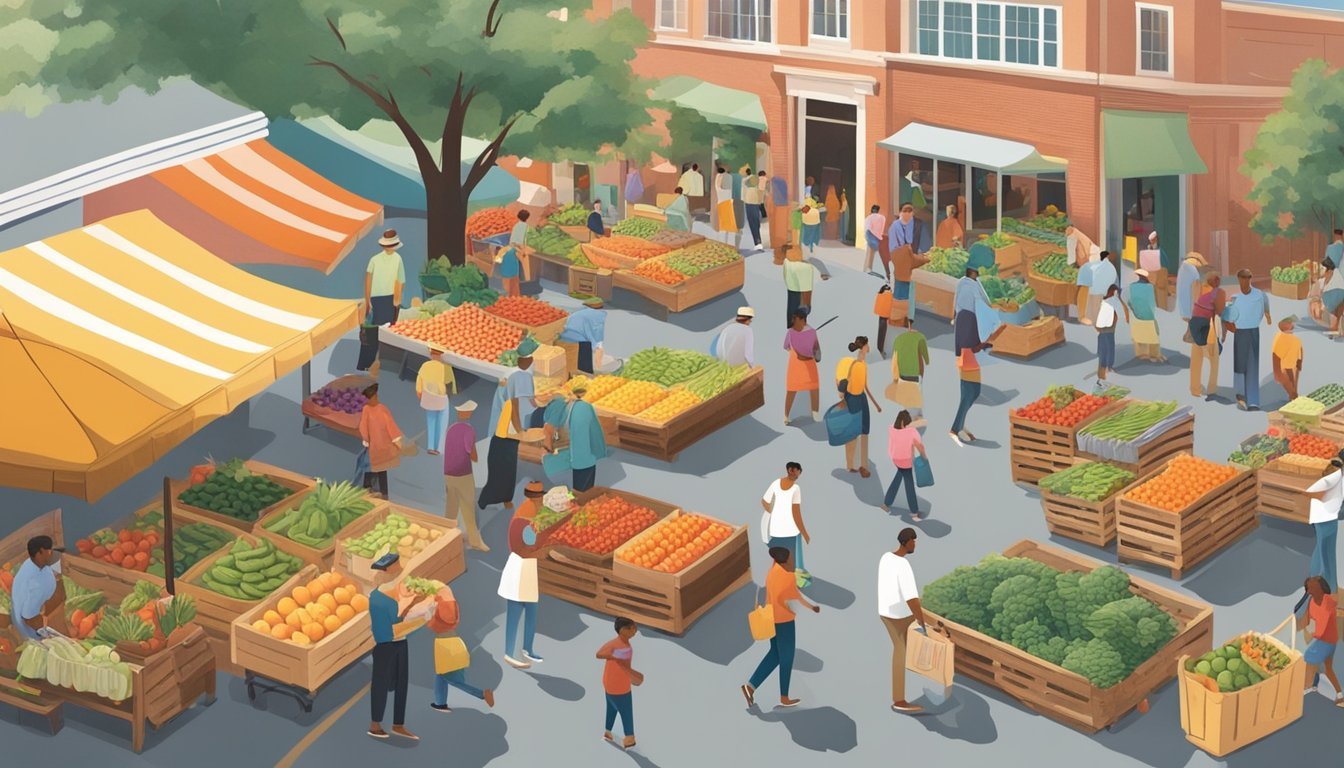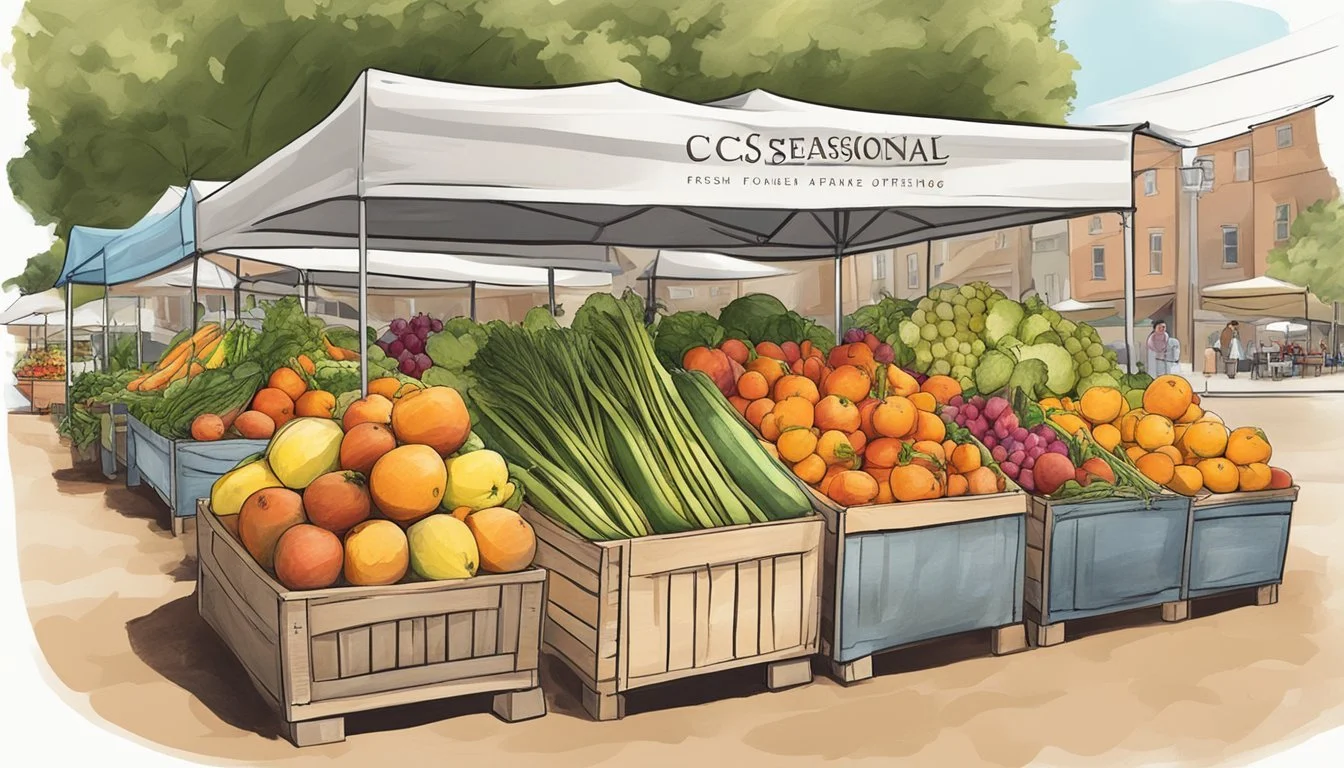Community Supported Agriculture (CSA) in Athens, GA
A Guide to Local Farm Partnerships
Community Supported Agriculture, commonly known as CSA, has taken root in Athens, GA, reflecting a growing desire among locals to forge a closer connection with their food sources. CSAs represent a partnership between farmers and the community, where individuals and families can subscribe to receive a share of the farm's harvest. This model provides consumers with regular deliveries of fresh, locally-grown produce, while offering farmers a predictable source of income and a direct line to their customers.
In Athens, the CSA scene is vibrant, with multiple farms offering an array of options tailored to different household sizes and preferences. For example, Finch Creek Farm operates a Certified Naturally Grown Vegetable Farm and has expanded its community reach through not only its CSA program but also by supplying produce to local farmers' markets, online markets, and area restaurants. Diamond Hill Farm, another CSA provider in the area, caters to the community with a variety of farm box choices, including options that range from vegetables to flower shares, highlighting the diversity within the CSA offerings.
The commitment to sustainable practices is often at the core of CSA operations in Athens, with local farms placing an emphasis on growing food in ways that are harmonious with the environment. This approach benefits not just the land and farmers but also the wider community, contributing to a more sustainable local food system. Through CSA programs in Athens, GA, residents have the opportunity to participate in a food system that values health, sustainability, and strong community ties.
History of CSA in Athens
Community Supported Agriculture (CSA) in Athens, Georgia, has evolved from a small-scale operation to an integral part of the local food landscape. This section traces the origins and expansion of CSA programs in Athens, offering insights into their development and current growth.
Origins and Development
The concept of CSA began gaining traction in Athens, Georgia, with the establishment of small farms that sought to connect directly with consumers. These farms laid the foundation for a community-oriented approach to agriculture, focusing on sustainable practices and local distribution.
Growth of CSA Programs
Since the early establishment of these CSA models, Athens has seen a notable increase in the number of CSA programs. These programs have been embraced by the community, showcasing a strong preference for locally-sourced produce and fostering deeper connections between farmers and consumers. Several farms in and around Athens continue to contribute to this flourishing CSA scene, reflecting the city's commitment to nurturing a sustainable food system.
How CSA Works
Community Supported Agriculture (CSA) embodies a partnership where consumers support local farmers by subscribing to receive regular farm products, thus sharing both risks and benefits.
The Role of Farmers and Consumers
Farmers in Athens, GA offer shares to the public, which represent parts of their farm's yield. These shares are typically boxes of vegetables though may also include fruits, herbs, and other farm products like eggs or honey. Consumers become members of the CSA by purchasing these shares, showcasing a commitment to the farm and contributing to the farm's financial stability or "investment".
Types of CSA Models
There are several CSA models to choose from based on consumer preference:
Traditional CSA (Farmer's Choice): Farmers select the produce based on seasonal availability.
Market-Style CSA: Members choose their own produce, akin to shopping at a farmers' market.
Subscription Process
Subscriptions usually run on a seasonal basis, where consumers pay in advance to receive their shares:
Select a CSA program.
Choose a subscription type (e.g., small, medium, large).
Pick up the produce weekly or biweekly at designated locations.
Consumers benefit from fresh, locally-grown produce, while farmers gain a direct and reliable market for their products.
Benefits of Joining a CSA
Community Supported Agriculture in Athens, GA, offers a range of benefits that span economic, environmental, and health aspects. In addition to supporting local farmers and contributing to sustainability, members receive fresh, nutrient-rich produce.
Economic and Social Advantages
Joining a CSA fosters a thriving local economy by ensuring that monetary investments stay within the community. Members directly fund local farms, which bolsters the viability and growth of small agricultural businesses. Economic benefits extend to creating social ties, as CSAs often become focal points that strengthen community bonds. They provide consumers with a sense of participation and shared commitment, which, in turn, can lead to increased civic engagement.
Supports local farmers: Direct financial support to farmers helps stabilize their operations.
Strengthens community ties: Members feel a sense of belonging and collective purpose.
Environmental Impact
The adoption of a CSA model is pivotal in creating a sustainable food system. By emphasizing locally grown, seasonally available items, CSAs minimize the carbon footprint associated with long-distance transportation of goods. This system not only conserves energy but also ensures that members have access to food that is cultivated following eco-friendly practices.
Reduces transportation emissions: Fewer miles from farm to table mean a smaller carbon footprint.
Promotes sustainable farming: Encourages practices that have less impact on the environment compared to conventional agriculture.
Health and Nutrition
When individuals join a CSA, they gain access to a variety of fresh fruits and vegetables that are often picked at their peak of ripeness, which maximizes their nutritional value. A diet rich in farm-fresh produce is associated with numerous health benefits, including the reduced risk of chronic diseases. Furthermore, CSA members typically enjoy a diverse array of produce, which encourages a more varied and nutrient-dense diet.
Nutritional Advantage: Fresh produce equals higher nutrient content.
Encourages Healthy Eating: Regular supply of fruits and vegetables promotes a healthier diet.
Choosing the Right CSA
When selecting a CSA in Athens, GA, potential subscribers should assess various factors to ensure their choice aligns with their preferences and needs.
Factors to Consider
Before committing to a CSA, individuals should consider the proximity of the farm to their residence, as local pick-up is a common practice. They should also evaluate the subscription terms to understand the commitment duration and payment plans. These factors influence the convenience and feasibility of maintaining a CSA membership.
Proximity: How close is the farm to your home or workplace?
Subscription terms: What are the length and flexibility of the commitment?
Certification and Farming Practices
It is essential to inquire about the farming practices and certifications held by CSA farms. The title "Certified Naturally Grown" is particularly noteworthy, indicating adherence to sustainable and natural farming methods without synthetic fertilizers or pesticides. This certification can be a trust marker for consumers who prioritize eco-friendly practices.
Certified Naturally Grown: Gesture towards environmentally conscious farming.
Farming Practices: Explore whether the farm uses sustainable methods.
Understanding CSA Offerings
CSAs typically offer a variety of products, which may include vegetables, fruits, and sometimes added options like flowers. The Athens local community can benefit from exploring local farmers' markets or using a directory to understand the diversity of CSA offerings. They should ask questions about product variety, frequency of distribution, and any limitations, such as seasonal availability.
Product Variety: Determine the range of produce offered.
Distribution Frequency: Clarify how often you’ll receive your share.
Seasonal Limitations: Acknowledge the cyclical nature of produce availability.
CSA Seasonal Offerings
In Athens, Georgia, residents can take part in Community Supported Agriculture (CSA) to enjoy a diverse selection of fresh produce that fluctuates with the changing seasons.
What to Expect Throughout the Year
CSAs function by providing subscribers with periodic shares of the harvest. These shares typically consist of a box brimming with various seasonal vegetables and fruits. The offerings are often influenced by the time of year and can include additional farm products alongside the primary produce.
Winter: Members might find hearty winter squash and leafy greens like kale in their shares.
Spring: This season often introduces a variety of leafy vegetables including arugula, alongside the first of the year's strawberries.
Summer: The warmer months are prime time for a rich assortment of peppers and succulent strawberries, bursting with flavor.
Fall: Potatoes and a second crop of kale can typically be found in the autumnal shares.
Sample Seasonal Vegetables and Fruits
Different crops are planted and harvested at various times throughout the year. Below is a sample of what one might find in their CSA share during specific seasons in Athens, GA.
Winter:
Vegetables: kale, arugula, winter squash
Fruits: limited due to cold weather
Spring:
Vegetables: arugula, kale, baby carrots
Fruits: strawberries, early-season cherries
Summer:
Vegetables: peppers, tomatoes, cucumbers
Fruits: strawberries, peaches, blueberries
Fall:
Vegetables: kale, potatoes, winter squash
Fruits: apples, late berries
It is important for subscribers to understand the cyclical nature of farming and to anticipate the rotation of crops that CSA shares will reflect as the seasons progress.
Athens CSA Locations and Farms
The Athens area boasts a vibrant network of CSA locations and farms, offering an array of fresh, locally-grown produce directly to consumers.
Directory of CSAs in Athens
Community Supported Agriculture (CSA) in Athens, GA:
Finch Creek Farm, Inc.: Located between Winder and Statham just above HWY 211, Finch Creek Farm provides a selection of Certified Naturally Grown vegetables and participates in local farmers' markets.
Diamond Hill Farm: Positioned on the outskirts of Athens, this farm offers a variety of CSA options inclusive of vegetables and flower shares.
Foster Brady Farm: Situated in Monroe, this family-operated farm produces Certified Naturally Grown produce, eggs, mushrooms and more.
Please note that locations and offerings may vary. Visiting a local farmers market or contacting farms directly can provide the most current information on CSA offerings.
Highlights of Local CSAs
Athens Farmers Market: It is a prime location for community members to engage in the local food system and find an assortment of CSA programs from area farms.
Local Farm Spotlight:
Family-Run Farm: Foster Brady Farm in Monroe is emblematic of the family-run farms in the region that contribute to the CSA model, offering local consumers a plethora of fresh agricultural products.
CSA Farm Insight: Diamond Hill Farm, managed by Carter Dodd since 2012, demonstrates dedication to producing nutritious food and beautiful flowers sustainably, further enriching the local CSA landscape.
Collective Harvest: This collaborative effort among local growers exemplifies the strength of Athens' agricultural community, which thrives on direct farm to consumer relationships made possible by CSA programs.
Community and CSA
In Athens, GA, the concept of Community Supported Agriculture (CSA) weaves a vital connection between consumers and local farms, nurturing strong community bonds and ensuring the availability of fresh, locally grown produce.
Building Relationships through CSA
Community Supported Agriculture initiatives in Athens foster personalized relationships between the local community and group of farmers. Consumers commit to the harvest of a specific farm or collective of local growers, receiving regular produce shares. This model promotes a mutual commitment: consumers gain a reliable source of fresh, seasonal produce while providing farmers with a stable income and deeper connection to their consumer base.
Consumer Benefits: Fresh, local produce; Support of local agriculture
Farmer Benefits: Stable market; Enhanced community support
CSA’s Role in Local Food Directories
CSAs act as a cornerstone within local food directories, linking consumers directly with fresh food sources. In Athens, CSA offerings often feature in local farmers' markets and specialized online platforms, simplifying the process for individuals to find and subscribe to a farm's produce. A market manager may facilitate these connections, ensuring that information about CSA subscriptions and seasonal offerings is accessible and up-to-date.
Local Food Directories Include:
Farmers' markets
Online platforms (e.g., locallygrown.net)
Community garden initiatives
These directories empower consumers to make informed choices about where and how they procure their food, further ingraining CSA into the fabric of Athens' communal life.
Supporting CSA beyond Membership
Investing in Community Supported Agriculture (CSA) goes beyond purchasing a membership; it's about building a resilient local food ecosystem and enhancing consumer awareness of sustainable practices.
Community Involvement and Awareness
Community involvement plays a pivotal role in strengthening CSA programs. Patrons can volunteer at participating farms or assist in organizing community events that showcase CSA benefits and organic food. Encouraging conversations about the advantages of supporting local, Certified Naturally Grown farms can lead to a broader understanding and appreciation of sustainable and biodynamic farming practices. Education about CSAs can unfold through localharvest.org, known for its extensive database of local food venues.
Volunteer Opportunities: Hands-on participation in farm activities.
Educational Events: Workshops and farm tours to spread knowledge.
Promoting CSAs within Larger Cities
CSAs face unique challenges in larger cities like Atlanta. However, urban restaurants can champion the local food movement by incorporating CSA produce into their menus, thereby making organic and sustainably grown food more accessible. Investment in CSA can also be enhanced through partnerships with local businesses, aiming to serve as pick-up points or promotional allies. This symbiotic relationship not only supports the local economy but also fortifies the local food ecosystem against large-scale, industrial food production threats.
Restaurant Partnerships: Highlighting CSA-sourced items on menus.
Business Collaborations: Creating a network of local supporters.
CSA Events and Education
Within Athens, GA, Community Supported Agriculture programs are more than just a source of fresh produce; they are a hub for community engagement and education. CSA members have the opportunity to deepen their knowledge of agriculture through various events and educational programs offered by local farms.
Workshops and Farm Visits
Local CSAs often host workshops focusing on sustainable farming practices, seasonal planting, and soil health, allowing members to learn directly from experienced farmers. These hands-on workshops enable community members to engage with the day-to-day realities of farming. Farm visits are regularly scheduled events where members can tour the fields, discuss crop planning, and participate in farm activities, fostering a sense of connection to the land and their food source.
Upcoming Workshop: "Companion Planting for Beginners"
Next Farm Visit: Saturday, April 12th, Meet at the barn at 10 AM.
Cooking Classes and Recipe Sharing
To enhance the CSA experience, Athens farms often conduct cooking classes tailored to prepare the box's contents. These classes help customers make the most of their seasonal vegetables, introducing new flavors and cooking techniques. Furthermore, recipe sharing platforms are established either on farms' websites or during market pick-up days, where members can exchange their favorite ways to use their CSA vegetables.
Next Cooking Class: "Seasonal Soups from Scratch," Tuesday, April 15th, at 5 PM.
Recipe Exchange: Join our online community board to share and discover new recipes every week.
Economic Impact of CSA
Community Supported Agriculture in Athens, GA, positively influences the local economy by fostering direct financial relationships between farmers and customers. This model ensures that sale proceeds are reinvested into the local community and agricultural practices.
CSA Contributions to Local Markets
Community Supported Agriculture (CSA) schemes strengthen the local markets by ensuring that a more significant portion of the consumer's food budget goes directly to local farmers, as opposed to being split among various supply chain intermediaries. By subscribing to CSAs, consumers provide farmers with upfront capital, which can alleviate the financial stress of the growing season and allow for better planning and resource allocation. This direct injection of funds helps sustain the agricultural economy and supports local jobs and businesses.
Direct Sales Benefits:
Farmers: receive payment upfront, enhancing financial security.
Customers: gain access to fresh, locally-grown produce.
Local Economy: Benefits from circulation of money within the community.
Case Studies of Successful CSA Operations
Finch Creek Farm in Winder, just outside Athens, is a successful case study of CSA's economic impact. Started in March 2011, the farm implemented a Certified Naturally Grown Vegetable Farm and has since then served the community through CSAs, local farmers' markets, and restaurants.
Finch Creek Farm Profile:
Location: Winder, GA
Established: March 2011
Services: CSA, farmers' markets, local restaurants
Contribution: Demonstrates CSA's role in creating sustainable local food systems and bolstering consumer-farmer relationships.
These CSA models exemplify how agricultural practices embedded in the community bring about economic value for both farmers and consumers, reinforcing the sustainability of the local food system.
Challenges and Considerations
Community Supported Agriculture in Athens, GA faces specific challenges that require careful consideration and strategic planning to ensure sustainability. The success of CSAs hinges on the delicate balance between producer commitments and consumer expectations under varying market conditions.
Addressing Potential Issues
CSAs must navigate limitations inherent to the model, such as the unpredictability of yield and the need to maintain strong relationships with members. The producers must communicate effectively with consumers to set realistic expectations regarding harvest variability.
Communication: Producers should employ clear, timely methods to inform members about crop statuses.
Expectation Management: Setting accurate expectations for harvests can preserve consumer trust.
Mitigating Risks for Farmers and Consumers
Creating a sustainable food system through CSAs involves mitigating risks for both farmers and consumers. Farmers need strategies to cope with the ebb and flow of market conditions, while consumers require assurance of receiving their share of the harvest.
Risk Sharing: CSAs inherently involve shared risk, where consumers are made aware that their investment is subject to the uncertainties of farming.
Support Structures: Building a strong support network can help sustain CSAs during challenging periods.
Farmers in Athens, GA can develop contingency plans that might include crop diversification or emergency funds to cushion the blow of a bad season. It is through these proactive measures that CSAs can endeavor to maintain a resilient and sustainable food system amidst fluctuating market conditions.











